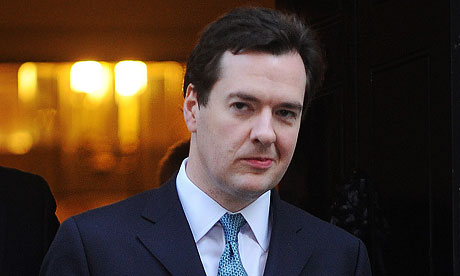
Foreign intelligence agencies are carrying out sustained cyberattacks on the UK Treasury, targeting it with malicious emails and programs designed to steal information, the Chancellor, George Osborne, has revealed.
He said that government systems are the target of up to 20,000 malicious emails every month, and said that in 2010 "hostile intelligence agencies made hundreds of serious and pre-planned attempts to break into the Treasury's computer system". In fact, Obsborne said, "it averaged out as more than one attempt per day".
Speaking to an invited audience at Google's Zeitgeist conference being held near Watford, Osborne said that the Treasury was the "most targeted" organisation in Whitehall by malicious software.
He cited an example where a "perfectly legitimate" email related to the G20 summit was sent to the Treasury and some other international partners – and then appeared again within minutes, sent to the same distribution list but with the attachment on the email swapped to one that contained malicious code that could infect machines running Windows. "To the recipient it would have looked like the attachment had been sent twice," Osborne said. "Fortunately, our systems identified this attack and stopped it."
A similar attack targeting the French Finance Ministry and the European Council last year succeeded in breaking into 150 computers ahead of the G20 summit.
Osborne did not specifiy the countries thought to be behind the attacks, or how it was known that they came from intelligence agencies rather than opportunist hackers. But Rik Ferguson, a security consultant at Trend Micro, said "our security services could analyse the code used in the attacks to figure out how sophisticated it is. But in all honesty the biggest issue with online criminality is the problem of online attribution – knowing where the control server for an attack is based doesn't necessarily tell you who is behind it."
Some analysts have suggested that the French attacks were done by Chinese hackers seeking an advantage in upcoming trade negotiations during the G20 summit.
The government said during the Spending Review last year that it would invest £650m in a national cyber security programme to enhance online security. That may be too late for some government departments.
In February the foreign secretary, William Hague, revealed at an international conference on security that Foreign Office computers were hit by data-stealing malware.
That in turn followed the determination by security specialists that US and Israeli security services collaborated to create the Stuxnet computer worm to disable Iran's nuclear fuel processing facility, and that Chinese government-backed hackers broke into Google's email system in 2009 to dig into email accounts of dissidents.
But Osborne insisted: "We are determined to get the security question right, so that we can maximise the opportunities that the internet age presents." He said that government could make significant saving by offering public services online rather than in paper form, and that ministers in future would have to justify why any aspect of a public service needed to be delivered through "traditional office channels".

